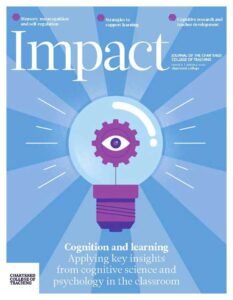Improving metacognition through explicit instruction of learning strategies
Written by: Claire Badger and Matt Corry

5 min read
A relatively incontrovertible aim of education is to enable students to become independent in their learning, equipping them with the skills to make strategic and reflective choices in their learning so that they become lifelong learners. What is more controversial is exactly how a school goes about achieving these aims. Since the publication of Carol Dweck’s work on growth mindsets (Dweck, 2000), there has been a great deal of interest in mindset interventions. However, a recent study by the EEF (Foliano et al., 2019) has shown little impact of mindset interventions, and some authors have suggested that a focus on improving students’ metacognition may be more successful (Sherrington, 2019).
Our approach
Following a similar approach to that taken by Durrington School (Allison, 2018), a Year 9 biology class was explicitly taught the six strategies for effective learning from the Learning Scientists (Weinstein et al., 2018): retrieval practice, interleaving, concrete examples, dual
Join us or sign in now to view the rest of this page
You're viewing this site as a guest, which only allows you to view a limited amount of content.
To view this page and get access to all our resources, join the Chartered College of Teaching (it's free for trainee teachers and half price for ECTs) or log in if you're already a member.
This article was published in September 2018 and reflects the terminology and understanding of research and evidence in use at the time. Some terms and conclusions may no longer align with current standards. We encourage readers to approach the content with an understanding of this context.
0
0
votes
Please Rate this content
Subscribe
Please login to comment
0 Comments
Oldest
Newest
Most Voted
Inline Feedbacks
View all comments










